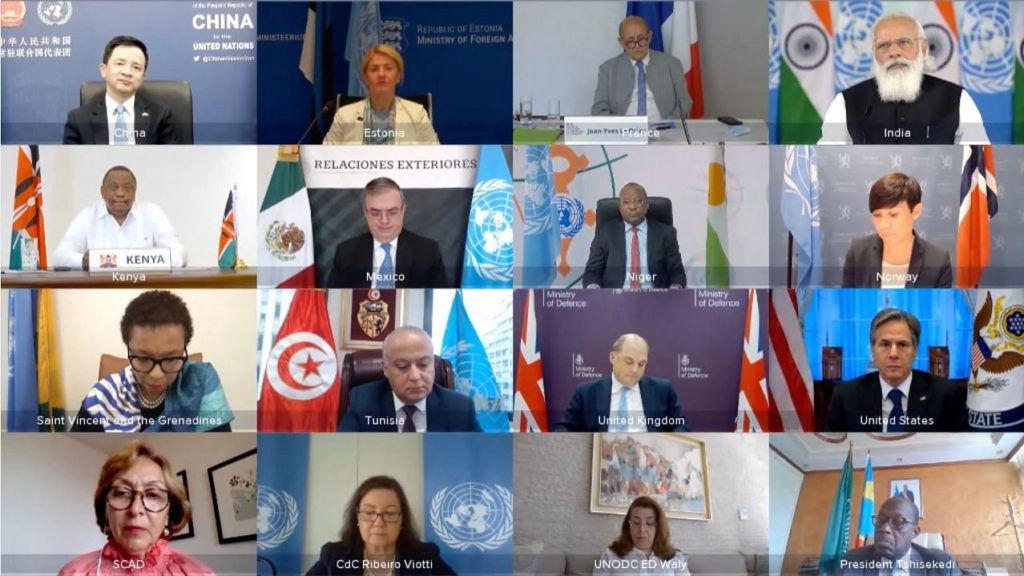In search of solutions to apparently insoluble international problems
The High-Level Open Debate on Enhancing Maritime Security: A Case for International Cooperation, held online by the UN Security Council on the 9th of August, should become an important step towards finding constructive compromise solutions to pressing international security problem

By Valentin Yakushik
Territorial conflicts, in which one of the parties is a great power, often seem practically insoluble for medium and small states involved in this type of confrontation. And the ever-increasing pollution of the environment (and in particular, the worlds oceans, seas, rivers and reservoirs) generally seems to be the final defeat of human civilization in its insane confrontation with the Nature. Though the United Nations does not lose hope to reverse the unfavorable course of events in the sphere of marine ecology, as well as to give a chance to a fair and effective settlement of territorial disputes concerning maritime areas and islands, rocks, reefs and similar territorial entities located within them, and to strengthen international security in the seas and oceans and in the airspace above them. It is those complex issues that were the focus of the recent UN Security Council High-Level Virtual Open Debate on Enhancing Maritime Security: A Case for International Cooperation on the 9th of August, 2021.
This debate has been initiated by Indian Prime Minister Narendra Modi, durin India’s month-long chairmanship of the UN Security Council in August 202. The videoconference discussions were attended by two heads of states: President of the Russian Federation Vladimir Putin (the only head of state among the countries permanent members of the UN Security Council) and President of Kenya Uhuru Kenyatta, by two prime-ministers: Narendra Damodardas Modi, Prime Minister of India, and Phạm Minh Chính, the Prime Minister of Vietnam, as well as by Antony Blinken, the US Secretary of State, Jean-Yves Le Drian, French Foreign Minister, Ben Wallace, UK Defense Secretary and others. It should be noted that China was represented by Dai Bing, Deputy Permanent Representative of the Peoples Republic of China to the UN.
Prime Minister Narendra Modi, who presided over the debate, proposed five basic principles for enhancing maritime security:
1. Removing barriers to maritime trade.
2. Settlement of maritime disputes by peaceful means and in accordance with international law, promoting mutual trust and confidence, and ensuring global peace and stability.
3. Countries jointly tackling maritime threats on the seas emanating from non-state actors and natural disasters.
4. Protecting the marine environment and marine resources, combating plastic waste pollution and oil spills.
5. Responsible maritime connectivity, introduction of structure to boost maritime trade, development of global norms and standards.
It was quite expected that the US Secretary of State Anthony Blinken sharply criticized the Russian Federation and the PRC, and the PRC representative Dai Bing also found sharp arguments for criticizing the United States, Japan and their partners in the QUAD Quadrilateral Security Dialogue
In this regard, the content and style of the constructive and non-confrontational speech of the Prime Minister of Vietnam, Pham Minh Chinh is instructive. He focused on three main aspects of maritime security issues and the search for responses to maritime security challenges.
1. It is imperative that states and international organizations develop a comprehensive, extensive and broad awareness of the importance of oceans and seas, and the threats to maritime security.
Within the framework of this understanding at the national level, Vietnam is implementing a strategy for the sustainable development of the maritime economy for the efficient and responsible use of marine resources in order to develop and enhance the potential of the region and the country.
2. The need to find global solutions to global maritime security problems. To effectively address such problems, comprehensive approaches based on cooperation, dialogue and international law are required, and strengthening of bilateral and multilateral cooperation at the regional, interregional and global levels is required.
In this regard, Vietnam proposes, with the help of the UN, as a coordinator, to develop a set of agreements and initiatives on regional maritime security in order to expand the exchange of information and experience, coordinate actions and timely resolve common problems. Vietnam looks forward to working closely with ASEAN and China to fully implement the 2002 Declaration of Conduct of Parties in the South China Sea (DOC) and to negotiate an effective and substantive Code of Conduct of Parties in the South China Sea (COC), consistent with international law, in particular the 1982 UN Convention on the Law of the Sea (UNCLOS 1982). All countries and multilateral institutions, especially UN agencies, should step up assistance and pay due attention to the hardships and interests of developing countries.
3. The policies, regulations and conducts of states at sea must be in line with international law, especially the United Nations Charter and UNCLOS 1982. States shall uphold fully their legal obligations under the Convention, respect the sovereignty, interests and legitimate economic activities of relevant states, settle disputes through peaceful means in line with international law, respect diplomatic and legal processes, and ensure freedom, safety and security of navigation and overflight, without resorting to acts that would complicate the situation or create tension.
The Vietnamese Prime Minister showed that a calm tone and a principled competent position, focused on finding balanced compromise solutions based on the norms and principles of international law, on common sense and responsibility both to their peoples and to humanity are needed in solving complex international issues.
The High-Level Open Debate on Enhancing Maritime Security: A Case for International Cooperation, held on line by the UN Security Council on the 9th of August, 2021, should become an important step towards finding constructive compromise solutions to pressing international security problems.
The author is Professor, National University of Life and Environmental Sciences of Ukraine. He can be reached at: yakushik@hotmail.com
We welcome all pitches and submissions to IAR via email: iareview2019@gmail.com